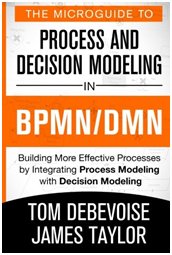Business Decisions and Business Processes need to be analyzed and improved simultaneously for better business outcomes. Following are some practical notes from the field on the correct perspective for this.
1. Decisions are a network or a hierarchy, not a flow
Decision Analysis does not need a flow-based sequential thinking like Process Analysis. Unlike processes, decisions are evaluated in a network where a number of lower-level decisions are made to aggregate up to the main business decision of interest. This state-less decision can be plugged into a process with the process then flowing on down the time dimension.
A decisions-first approach starts by stating the business decision that needs to be made. The next step is to list down the information and knowledge needed to make that decision, and potentially other sub-decisions that need to be made to better inform the higher level decision. Decisions, information and knowledge sources are thus discovered incrementally and organized logically in a Decision Requirement Model.
It is critical to ignore any imagined or real sequencing constraints at this stage of decision analysis. Analysts conditioned in Process Analysis naturally gravitate towards thinking in terms of, ‘this decision first and then the next, followed by the third one.’ This analysis has the potential of ‘smearing’ business decision-making across multiple processes – with associated business rules and data getting fragmented across processes as a side-effect. This process-first approach can result in unnecessary complexity leading to reduced business agility.
Decisions are made at a point in time based on the best information and knowledge available at that time. A number of lower level ‘sub-decisions’ may need to be made to get intelligent inputs for a higher level decision. This is a logic sequencing not a task sequencing and the distinction is critical during systems implementation. Logic sequences can be implemented in a single system component, simplifying business logic maintenance as well as integration and data requirements. In contrast, task sequences are generally multiple system components because there is a time dimension involved. Decision analysis is thus done along with process analysis, not after a process analysis has already spread decisions across the workflow.
2. Businesses are more likely to change Stateless Decisions than Flow based Processes
Most businesses adjust their rules and policies to respond to competitive pressure and customer demands in order to make better decisions about how the business operates on a daily basis. This decision-making changes much more frequently than any large scale changes to business processes.
Recognizing that business decision making has to be more agile than business process management, it is a just a small step to the realization that business decisions should be defined and managed as explicit business assets.
Decision management technology now allows decisions to be implemented as stand alone components that can be managed centrally by business users while being accessed by a diverse set of systems in the landscape.
3. Not every operation can be improved through Process Analysis
There is a class of processes that are not ‘process-ey’ enough to be improved through Business Process Management (BPM) alone. These processes are ones that exist mostly to make a decision based on some defined business logic. Determining the eligibility of an applicant for a loan is an important process and a core function but the most interesting aspect is how that decision is actually made. The best way to improve business outcomes is to improve this decision making. And to do that, we need to explicitly define and describe that decision. We find that the complexity inside the process shell is due to sophisticated decision-making algorithms and not due to workflow processing. Business Decision Management (BDM) toolsets are better suited for analyzing these decision-making processes.
Process analysis will get us far in our pursuit of business efficiency, but not far enough in effectiveness – unless we evaluate the decisions our systems make and our people make as part of executing processes. And sometimes when we look at a complex part of our business through a process lens we may find that there is hardly any process there! All that complexity is because of a large ball of decision logic inside a very thin process shell. None of the usual process analysis tools can pierce too deep into this complexity and we need decision analysis to move further.

















